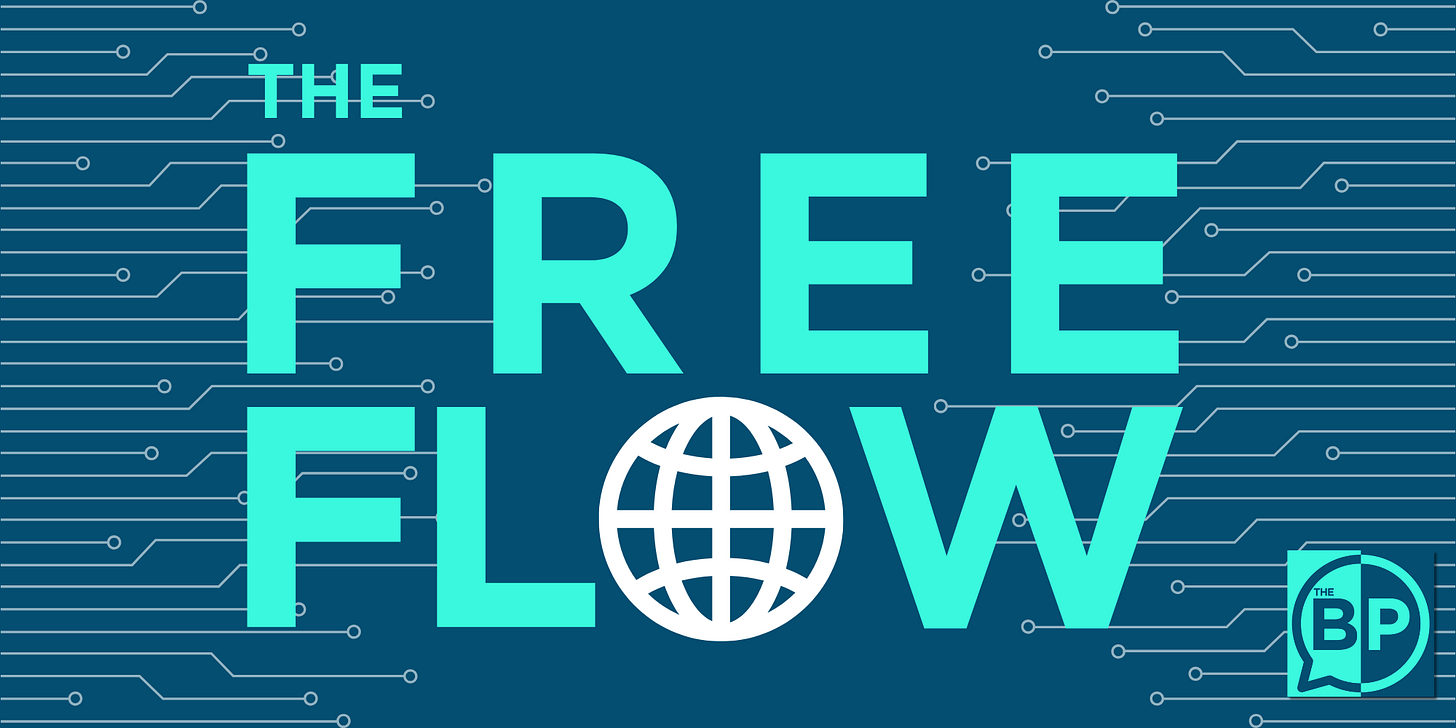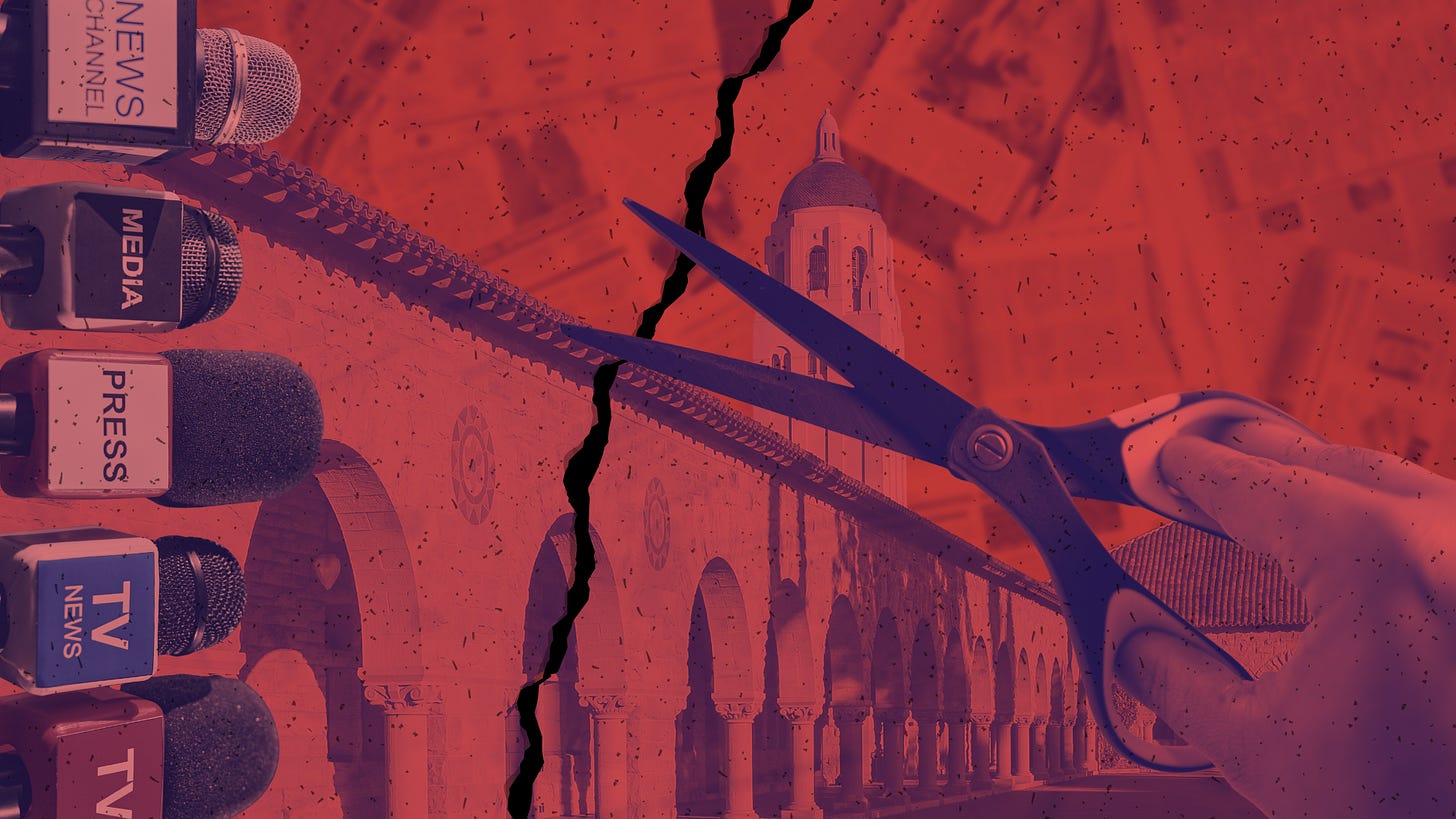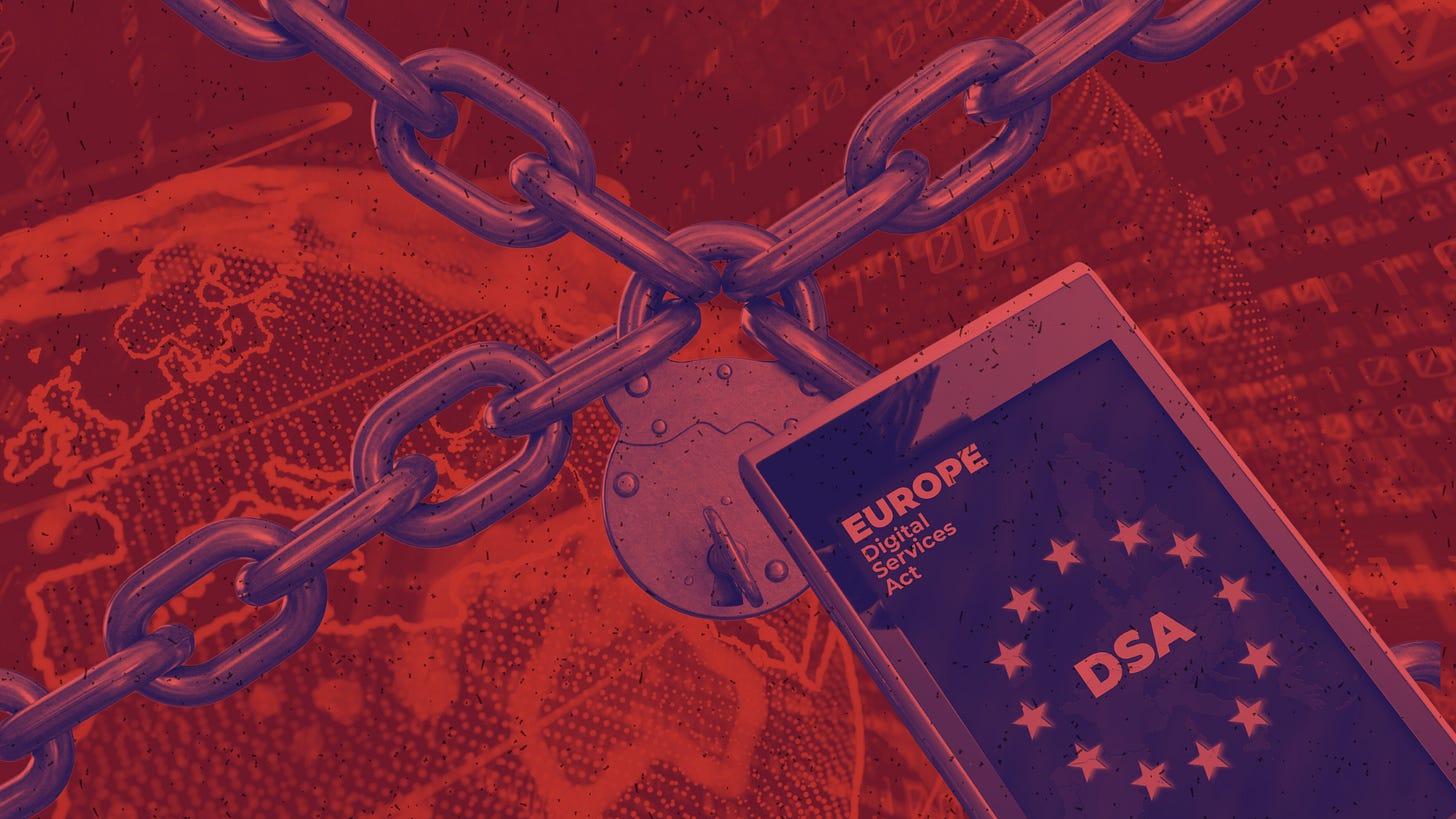UK Age-Verification Chaos & Russian Internet Shutdowns | The Free Flow 8/14/25
UK age verification law wreaks havoc, blocked websites in Russia surge, California deepfake ban is struck down, and more!
This Week At A Glance 🔎
— 🇬🇧 UK Age-Verification Law Creates Chaos Online
— 🇷🇺 25,000 Websites Blocked in Russia Amid Internet Blackouts
— 🇺🇲 X Wins Legal Challenge against California’s AI Deepfake Ban
— 🇮🇳 India Raids Kashmir Bookshops over Banned Books and Authors
— 🇹🇭 Thai Art Exhibit Forced to Remove Criticism of China
First of All 🇺🇲
Stanford Daily Sues Trump Administration Over Alleged Free Speech Violations
Stanford University’s student newspaper filed a lawsuit against the Trump administration, alleging that officials have weaponized federal immigration law to target foreign students and staff with pro-Palestinian views.
The Lawsuit:
The plaintiffs claim that the “Deportation” and the “Revocation” provisions of the Immigration and Nationality Act have been used to threaten deportation and visa revocation against foreign pro-Palestinian activists.
The provisions empower the Secretary of State to revoke visas or documentation if they determine “that the alien’s admission would compromise a compelling United States foreign policy interest.”
International staff members of the paper have reported self-censorship, and that lawfully present nonstudents are refusing to speak with journalists and requesting removal of their names, quotes, or photos.
Department of Homeland Security spokesperson Tricia McLaughlin called the lawsuit “baseless,” and said they are under no obligation to let “terrorist sympathizers” come or stay in the country.
Corporation for Public Broadcasting to Shut Down After Loss of Federal Support
The Corporation for Public Broadcasting (CPB), which supports local public TV and radio stations, will shut down after losing $1.1 billion in previously approved federal funding.
Context:
The CPB has served as a conduit for federal funds to public news outlets, including NPR and PBS.
On July 4, President Trump signed into law a massive bill that included a provision rescinding CPB’s funding.
PBS President Paula Kerger said, “These cuts will significantly impact all of our stations, but will be especially devastating to smaller stations and those serving large rural areas.”
Our Take: Eliminating the CPB doesn’t violate the First Amendment since the government has no obligation to fund it and subsidize speech. But dismantling a key funding channel for public media is likely to create an uneven press landscape where rural and smaller communities lose access to diverse, independent news. — Ashkhen Kazaryan
The Digital Age 🤖
Russia: 25,000 Websites Blocked and Surge in Internet Blackouts
Russian residents have reported a surge of internet blackouts after disruptions in Moscow started in May, while the total number of blocked websites in the country has exceeded 25,000.
Internet Blackouts:
Internet disruptions began in Moscow during May’s “Victory Day” celebrations, which the Kremlin later explained was a defense against Ukrainian drone attacks.
Since then, the independent digital monitoring project Na Svyazi, reported over 2,000 internet shutdowns in July, triple the amount during June.
Website Shutdowns:
Roskomsvoboda, a Russian non-profit focused on promoting digital rights, found that approximately 5,000 additional sites have been blocked, approaching around 25,000.
Many of the blocked sites are Ukrainian and international foundations or include donation links for Ukraine and syndications of media outlets’ work, including the BBC, which was blocked in 2022.
Australia’s Teen Social Media Ban Will Now Include YouTube
A ban prohibiting minors under the age of 16 from owning accounts on TikTok, Instagram, Facebook, X, and Snapchat in Australia will now include YouTube.
Details:
Under the ban, which is set to take effect in December, teenagers will not be allowed to have an account on YouTube, but can still view videos.
Tech companies will be required to deactivate existing accounts, prohibit new ones, and stop any workarounds, or face up to to A$50M in fines.
Federal Communications Minister Anika Wells said that while there is a place for social media, “there’s not a place for predatory algorithms targeting children.”
Our Take: This sweeping ban is an act of government overreach. The government wants to decide what minors see, hear, and learn, instead of their parents and themselves. This decision is only going to continue leading Australia down the slippery slope into the land of Big Brother. — Ashkhen Kazaryan
X Wins Legal Challenge to California’s Election Deepfake Law
A federal judge has struck down a California law banning AI-generated deepfakes during elections after Elon Musk and his platform X challenged the rule.
The Law:
The law would have blocked platforms from hosting misleading, AI-generated election content in the run-up to a vote.
U.S. District Judge John Mendez said he also intends to overrule a second law that requires labels on digitally altered campaign materials and ads.
In Court:
Judge Mendez invalidated the first law based on Section 230 of the federal Communications Decency Act, which shields platforms from liability for third-party content.
He declined to give an opinion on the plaintiff’s First Amendment arguments and said, “I’m simply not reaching that issue.”
Mendez said he would write an official opinion on the second law in the coming weeks, adding it “fails miserably in accomplishing what it would like to do.”
Our Take:
In a column at MSNBC, Jacob Mchangama argued that California’s law would “chill political speech, infringe on Californians’ ability to criticize politicians, undermine platforms’ rights to moderate content, and even prevent people from highlighting 'deceptive' content as fake.”
Jacob also cited research showing how the extent and impact of disinformation, including deepfakes, are typically much smaller than alarmist narratives assume.
Kentucky Town Uses AI to Bridge Political Divides
A month-long “town hall” used AI to collect and synthesize feedback from nearly 8,000 residents in Warren County, Kentucky (which contains Bowling Green).
Details:
Using Pol.is, an open-source polling platform with great success in Taiwan, the county surveyed participants on what they wanted to see in their community over the next 25 years.
Sensemaker, an AI tool that analyzes large sets of online conversations, found 2,370 ideas that at least 80% of respondents could agree on and consolidated them into a policy report.
The experiment was “the largest town hall in America,” said Warren County judge executive Doug Gorman, who found broad agreement when ideas were presented anonymously and without political identity.
The survey reached people who were unable to attend town halls and was accessible in multiple languages to immigrants who may have been excluded from such conversations.
Our Take: There’s been a lot of talk about the dangers of AI, particularly when it comes to its effect on our political process. But this shows how we can harness this technology as an empowering tool for communication that bridges divides caused by hyperpartisanship and polarization without sacrificing free speech. — Jacob Mchangama
The Brussels Effect: Europe and Beyond 🇪🇺
Rubio Orders U.S. Diplomats to Lobby Against EU Digital Services Act
In an August 4 State Department cable, U.S. Secretary of State Marco Rubio instructed diplomats in Europe to launch a lobbying campaign against the European Digital Services Act, citing concerns over Americans’ free speech and financial impositions on tech companies.
Details:
The cable tasked U.S. diplomats across European embassies to “build host government and other stakeholder support to repeal and/or amend the DSA or related EU or national laws restricting expression online.”
Suggested talking points included advocating for a narrower definition of “illegal content,” suggesting withdrawing or amending the Code of Conduct on Disinformation, removing or reducing fines for non-compliance, and not relying on “trust flaggers.”
The directive orders diplomats to investigate claims of censorship, including but not limited to the DSA, and document related arrests, court cases, property seizures, and online suspensions.
Our Take: There are strong reasons to criticize the DSA and European speech regulations, which have become increasingly restrictive. The US is right to push back against the “Brussels Effect” and the EU’s censorial Elite Panic surrounding online hate speech and disinformation. However, unless the Trump administration refrains from undermining the First Amendment at home, its efforts are likely to be met with cynicism and indifference. — Jacob Mchangama
UK Online Safety Act Has Chaotic Rollout of Age-Verification Requirements
On July 25, a portion of the Online Safety Act requiring websites with content “harmful to children” to verify user ages and restrict content for minors went into effect. In just two weeks, it has caused a host of issues.
About the Online Safety Act:
Content is also restricted for anyone who declines to submit an ID, facial scan, or other identification methods to comply.
Anonymous accounts are blocked from accessing sexual imagery or content related to self-harm or eating disorders.
Platforms must take steps towards restricting access to “priority content,” which encompasses a broad range of anything hateful about race, religion, sex, sexual orientation, and more.
Absurd Examples of Restricted Content:
Social media apps are blocking posts about the wars in Ukraine and Gaza without age verification.
An X post featuring the famous artwork, Saturn Devouring His Son, was restricted.
Spotify users may now have to scan their face to verify their age to watch a music video labeled 18+.
Subreddits about sexual health, quitting drinking, and smoking cessation have also been restricted.
Even an X thread about all of the things that are being blocked has apparently been subject to age restrictions.
Consequences and Responses:
Five of the top 10 free apps on Apple’s app store in the UK are now VPN apps — not just because of teens, but also adults who refuse to hand over their personal data.
On August 1, X’s Global Government Affairs Office released a statement against the Online Safety Act, arguing that it risks “seriously infringing” on free expression in the name of online safety.
Our Take: As global governments and states around the US consider age-verification laws for minors, what’s happening in the UK provides a first-hand experience of what free speech advocates have warned about when it comes to the practical implementation of such regulations — an erosion of anonymous speech and users’ privacy and the disruption of access to information online for adults. — Ashkhen Kazaryan
Free Speech Recession 🌍
India Raids Bookshops in Kashmir After Banning 25 Titles
Police in Indian-administered Kashmir raided bookshops and roadside vendors to enforce a new ban on 25 books deemed to promote “secessionism” or “false narratives” about the contested region.
Background:
The Home Department’s order — issued on the sixth anniversary of New Delhi’s imposition of direct rule — targets works by prominent authors, including Booker Prize winner Arundhati Roy, constitutional scholar A.G. Noorani, and historians Sumantra Bose, Christopher Snedden, and Victoria Schofield.
The books were “forfeited” under India’s 2023 criminal code, making their sale or possession punishable by prison time.
Authorities also seized Islamic literature under a separate directive issued earlier this year.
Critics, including historian Siddiq Wahid and separatist leader Mirwaiz Umar Farooq, called the ban unconstitutional and “authoritarian,” warning it erases historical narratives and chills academic inquiry.
Since 2019, Indian authorities have sharply escalated criminalization of dissent in Kashmir, targeting speech questioning India’s sovereignty.
London Police Mass Arrest Strategic Protestors of Palestine Action’s Ban
British police arrested 474 people in central London on Saturday after supporters of the recently banned pro-Palestinian group Palestine Action staged a protest outside the Houses of Parliament.
Context:
Parliament passed the ban in early July after activists broke into a UK Air Force base and damaged two tanker planes in protest of the country’s military support for Israel's war in Gaza.
Defend Our Juries, the protest's organizers, aimed to demonstrate the law's unenforceability by overwhelming police with Palestine Action supporters.
At The Protest:
They stated, “This is a major embarrassment to [the government], further undermining the credibility of this widely ridiculed law.”
London’s Metropolitan Police Service swiftly fired back and said anyone who held a placard expressing support for the group was “either arrested or in the process of being arrested.”
Part of a Wider Crackdown: In another incident, a protester in Leeds was arrested under the Terrorism Act for allegedly holding up a cartoon from Private Eye, a British satirical magazine, that made a joke about the Palestine Action ban.
Our Take: There is a growing proliferation of laws in Europe that make it a crime to “apologize for” or speak in favor of groups categorized as terrorists, as we have seen in France and currently on full display in the UK. Such laws open the door for politicization, abuse, and the targeting of controversial, but non-violent speech. — Jacob Mchangama
China Pressures Thai Art Show to Censor Tibet, Xinjiang, Hong Kong Works
A Bangkok exhibition on state violence and resistance was altered after Chinese embassy officials and Thai police reportedly pressured the Bangkok Art and Culture Center (BACC) to remove or obscure works referencing Tibet, Xinjiang, and Hong Kong.
The Exhibit:
The exhibition, Constellation of Complicity: Visualising the Global Machinery of Authoritarian Solidarity, opened in July and was backed by Bangkok’s Metropolitan Authority.
It included artists from exile communities in Tibet, Hong Kong, the Uyghur diaspora, Iran, Russia, and Syria.
Censorship
According to curators’ emails reviewed by Hyperallergic, the changes were made to “protect diplomatic relations” between Thailand and China.
Officials blacked out artists’ names and altered installations, citing the risk of “creating diplomatic tensions” with Beijing.
Affected works included Tibetan and Uyghur flags, films about indigenous activism, and graphics linking Chinese and Israeli surveillance of Muslim minorities.
Other politically sensitive flags — such as Palestinian or Rohingya — remained untouched.
Chinese foreign ministry spokespersons accused the show of “distorting” Beijing’s policies and “undermining China’s core interests,” praising Thailand for “timely measures” against promotion of “Tibetan independence,” “East Turkestan Islamic Movement,” and “Hong Kong independence.”
Our Take: As the U.S. retreats from its role as the global champion of free expression, China will continue to exert more influence on critical speech, not only in Asia but in other parts of the world where it has been investing in infrastructure and technology. — Jacob Mchangama
Ava Sjursen is a communications intern at The Future of Free Speech and a student at Boston College studying communications and political science.
Ashley Haek is a communications coordinator and research assistant at The Future of Free Speech.
Ashkhen Kazaryan is a Senior Legal Fellow at The Future of Free Speech, where she leads initiatives to protect free expression and shape policies that uphold the First Amendment in the digital age.
Jacob Mchangama is the Executive Director of The Future of Free Speech and a research professor at Vanderbilt University. He is also a senior fellow at The Foundation for Individual Rights and Expression (FIRE) and the author of Free Speech: A History From Socrates to Social Media.








